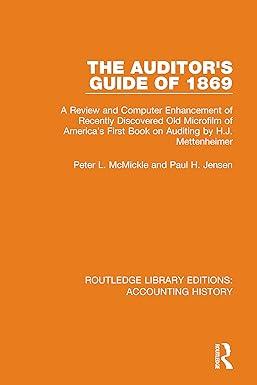Question
QUESTION 1 During the budget cycle, the budget can be used to: monitor and investigate any differences between the budget and the entity's actual results.
QUESTION 1
-
During the budget cycle, the budget can be used to:
monitor and investigate any differences between the budget and the entity's actual results.
reward positive performance.
reconsider long-term strategies.
all of the above options.
1 points
QUESTION 2
-
Which of the following statements regarding the participative style of budgeting is not true?
Department managers do not have ownership of the targets and budgets.
The targets and budgets are prepared after negotiations between senior management and department managers.
Provides department managers with an opportunity to create some 'room to move'.
Often results in targets that are easier to achieve.
1 points
QUESTION 3
-
Which of the following statements is correct?
Low liquidity ratios are undesirable.
High liquidity ratios may indicate excessive investments in unproductive current assets.
Low liquidity ratios can indicate liquidity problems.
All of the above statements are correct.
1 points
QUESTION 4
-
An interrelated set of budgets for a future period is known as:
a master budget.
a combined budget.
a program budget.
an assembly of budgets.
1 points
QUESTION 5
-
Capital structure ratios are also known as:
profitability ratios.
liquidity ratios.
gearing ratios.
efficiency ratios.
1 points
QUESTION 6
-
Which of the following categories of ratios is only relevant to a listed company?
Profitability ratios.
Liquidity ratios.
Market performance ratios.
Efficiency ratios
1 points
QUESTION 7
-
The difference between budgeted amounts and an entity's actual results is called a:
control tool.
budget error.
variance.
excess.
1 points
QUESTION 8
-
Production units x material cost per item plus target ending materials inventory less beginning materials inventory is the formula for which budget item?
required production units.
production overhead.
sales.
cost of material purchases.
1 points
QUESTION 9
-
If the market share price is $20 and the earnings per share is calculated to be $2.50, the price earnings ratio is:
4 times.
5 times.
8 times.
12.5 times.
1 points
QUESTION 10
-
Financial analysis is more meaningful if the ratios can be compared to an appropriate benchmark such as:
industry averages.
economic industry sector.
changes over time.
all of the options are appropriate benchmarks.
1 points
QUESTION 11
-
Preparing a cash budget is part of the process.
cash
control
planning
monitoring
1 points
QUESTION 12
-
A budget can be used as an effective control tool in monitoring an entity's achievements of its plans if the structure of its master budget mirrors the entity's:
balance sheet.
chart of accounts.
statement of profit or loss.
statement of cash flows.
1 points
QUESTION 13
-
If an entity has increased its profit from $25 000 last year to $40 000 this year, have they become more profitable?
Maybe.
Same both years.
Yes.
No.
1 points
QUESTION 14
-
The strategic planning process relates to:
shorter term planning (usually less than 1 year).
longer term planning (often 3 to 5 years).
shorter term planning (usually 1 to 3 months).
large entities only.
1 points
QUESTION 15
-
The days debtors ratio indicates:
the average length of time it takes an entity to pay its account payable.
the average length of time it takes an entity to collect its accounts receivable.
an entity's efficiency in paying back its borrowings.
an entity's efficiency in raising capital.
1 points
QUESTION 16
-
Financial analysis is useful for:
evaluating the performance of an entity.
evaluating the financial health of an entity.
decision making.
all of the above.
1 points
QUESTION 17
-
Which of the following does not measure asset efficiency?
Asset turnover ratio.
Return on assets.
Days inventory.
Times debtors turnover.
1 points
QUESTION 18
-
Which of these is not a commonly prepared budget?
Asset amortisation budget.
Operating budget.
Manufacturing overhead budget.
Inventory budget.
1 points
QUESTION 19
-
The budget process usually focuses on the time frame of one:
day.
week.
month.
year.
1 points
QUESTION 20
-
In a vertical analysis of a statement of profit or loss, the 100% figure would be assigned to:
sales.
gross profit.
expenses.
net profit.
Step by Step Solution
There are 3 Steps involved in it
Step: 1

Get Instant Access to Expert-Tailored Solutions
See step-by-step solutions with expert insights and AI powered tools for academic success
Step: 2

Step: 3

Ace Your Homework with AI
Get the answers you need in no time with our AI-driven, step-by-step assistance
Get Started


